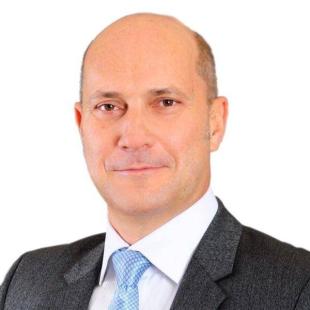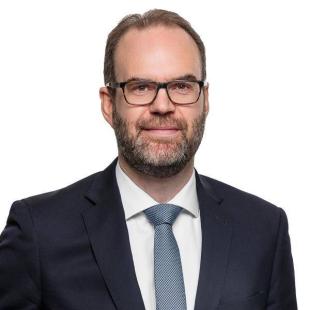
Patient-centric innovation in the life science and healthcare sectors – that was the overarching theme of this year's CMS Global Life Science and Healthcare Forum, held in Frankfurt on 21 November 2019. More than 120 participants from around the globe gathered to share their views on current developments shaking up the industry, legal challenges coming with them and how to embrace future-proof solutions.
In his opening remarks Nick Beckett, Global Co-Head of the CMS Life Science and Healthcare Sector Group and partner with CMS China/Hong Kong, emphasized the high degree of innovation one would currently see in the life science and healthcare markets around the world. Technology driven changes would also stretch the legal framework and show the need for innovative legal solutions.
This lead over to the first block of topics dealing with the rise of gene and immunotherapies. Michael Kahnert, legal counsel of BIO Deutschland, the sector association of the German biotechnology industry, gave an informative overview of the state of play of the biotech industry in Germany and Europe. He emphasized that the potential of biotech developments and application is enormous, and that biotech would be key to achieving truly patient-centric therapies. However, he also identified two main areas of concern: One was, in relation to Germany, an awkward regulation when it comes to receiving reimbursement for innovative therapeutic options. The so-called NUB gap would lead to delays in bringing such therapies to the market. The second was the difficult financing of biotech start-ups in Germany and Europe – as opposed, for instance, to the US. This was echoed by Daniel Courtney, Senior Director – Legal at HOOKIPA Pharma, who presented the success story of this comparatively small company. He touched on the challenges the company faced, both from a financing and legal perspective, and explained in a vivid manner how these hurdles were overcome. The subsequent discussion lead by Thomas Hirse, partner with CMS Germany, addressed a number of legal and practical questions and showed how important this industry continues to be – if only more investments could go into it.
Investment strategies and new forms of collaboration as a means of achieving patient-centric innovations formed the second block of topics. Stephen Aherne, partner with PwC UK, focused on current drivers shaping the life science and healthcare industries. He showed how technology driven both pharma and medtech meanwhile are and what the foreseeable future would bring in terms of innovations. Joseph Katz, partner with PwC UK, shifted the focus to the healthcare sector and its attractiveness for investors. He emphasized that it was a relatively crisis-proof sector to put one's money into: In the last seven market downturns, the healthcare companies had outperformed the market six times. When asked in the subsequent discussion, lead be Candice Blackwood, partner with CMS UK, whether the healthcare sector would also be prone to attract international investors – bearing in mind the legal framework which was to a large extent rather national – he stated that this depended on the actual area of healthcare. In many cases an international roll-out would certainly make sense, as one could see in practice already today. Collaboration as a means of achieving innovation and patient-centricity was at the core of the presentation held by Thomas de Charentenay, Sanofi Pasteur France. He focused on the chance of using data already available in a company by creating and analyzing data lakes. Such sources of real-world data would be valuable and could help to predict both clinical outcomes and new therapeutic options, as summarised also by Laurent Romano (partner at CMS France) in the panel discussion.
The importance of data for new business models using the chances of the digital transformation to achieve patient-centric outcomes was one of the cornerstones of Justus Wolff's presentation in the third block of themes headed "Thinking the unthinkable: What the digital transformation means to enhanced life science and healthcare". The manager and strategic adviser for digital health at Syte laid out what a successful business model would look like, what the practical challenges were in the development phase and how the legislative framework could impact the speed of innovation in this field. In this regard, the subsequent panel discussion lead by Roland Wiring (partner with CMS Germany) and Niall McAllister (partner with CMS UK) touched upon the Digital Healthcare Act just adopted by German parliament. This new law would provide, inter alia, for the app on prescription, which enabled a healthcare professional to prescribe medical apps – at the cost of public sick funds. Justus Wolff confirmed that Germany has taken the role of a frontrunner in this context, but that also a lot of the practical implementation steps remained so far unclear. This view was shared by Ulrich Juknat, legal counsel Germany at Johnson & Johnson medical devices, who presented on the use of artificial intelligence in healthcare, analyzing first regulatory steps in the US and the EU. He provided a practical definition of artificial intelligence and described various attempts by legislators to create a suitable legal framework. The US would be one step ahead, with the FDA having made first regulatory steps in an effort, as it would seem, to support such developments. In Europe, however, there would be a rather strong discussion on ethical issues related to the use of AI – a question that would be important but that should not block the discussions and the use of this powerful technology, especially in the medical devices field. Also, rather than looking at the software itself, what would be equally important, would be the quality of the data fed into the system as one of the key components the self-learning software would be based upon.
Medical devices and their evolution from products to increasingly patient-specific solutions formed the topic of the fourth theme block. In this session, moderated by Shuna Mason (partner with CMS UK) and Roland Wiring (partner with CMS Germany), Christina Zimmer, manager for regulatory affairs MDR at the German Medical Technology Association BVMed, described the state of play of the European medical devices regulation from a practical industry perspective. She noted that a considerable number of issues would still be open and needed quick regulation. In particular, there was a massive shortage of notified bodies and a considerable delay in the adoption of important legislative acts. This would create enormous strains for companies active in this sector – in particular those who had so far not been dependent on a notified body, as many medical software providers. This issue was reiterated by Jörg Hölzing, Global Head of Strategy & Customer Solutions at Roche, who presented on the future of diabetes care – from products to integrated solutions. He vividly showed the added value an integrated, data driven solution could bring to the individual diabetes patient. Comparing the traditional therapy with that an open ecosystem of integrated and interoperable devices and data flows could create, he set out what an enormous leap forward such interoperable systems would mean for the patient and the carers, especially in the case of young diabetes patients – for whom individualized, patient-centric solutions would be at least as important as for adults.
Picking up on the last session, Jens Wagner (Global Co-Head of the CMS Life Science and Healthcare Sector Group and partner with CMS Germany) summed up in his warp up remarks that this conference with its various presentations and lively discussions had shown how many opportunities the life science and healthcare sectors offered to become even more patient-centric than they are already today: What interesting, dynamic times we were living in and what motivating challenge to help overcome the legal hurdles, he concluded.







